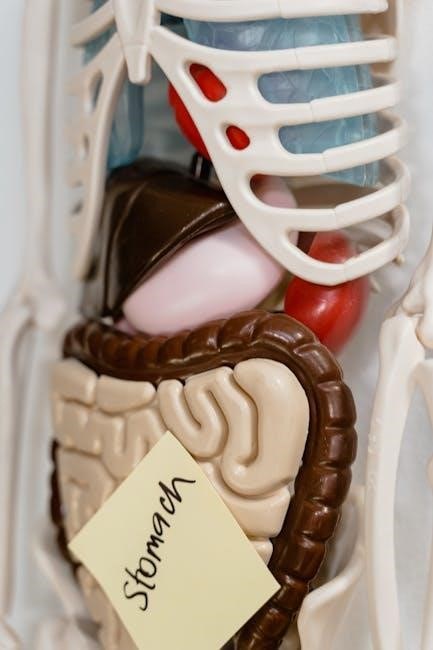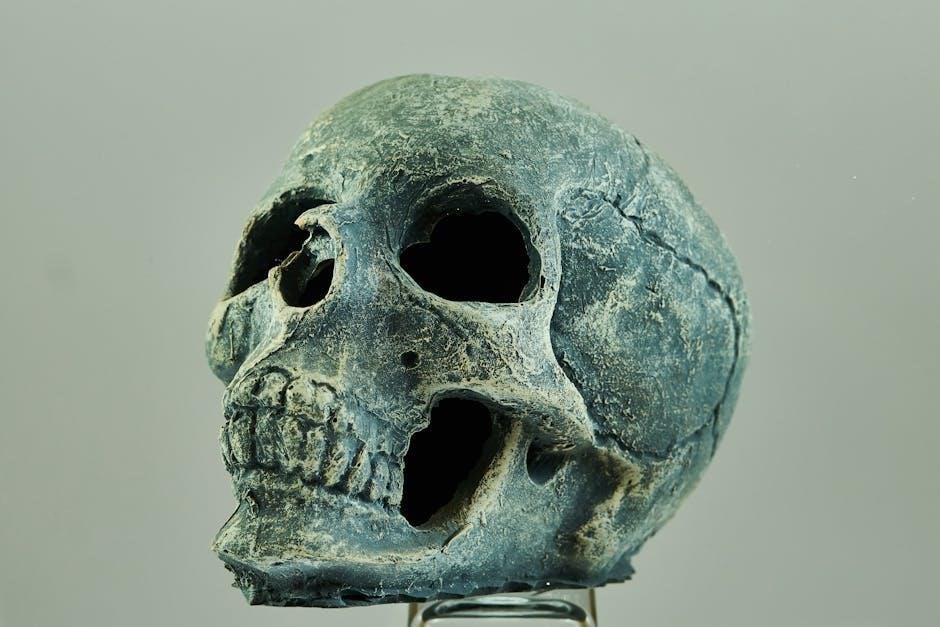
ib biology hl study guide
Welcome to the IB Biology HL Study Guide, your comprehensive resource for mastering the challenging IB Biology High Level course. This guide is tailored to help students navigate complex topics, offering detailed explanations, practical examples, and expert tips to excel in exams and internal assessments. Whether you’re struggling with molecular biology or genetics, this guide provides clear, structured support to ensure your success.
1.1 Overview of the IB Biology HL Course
The IB Biology HL course is a rigorous, two-year program designed to explore biological concepts in depth. It is structured around core topics such as cell biology, molecular biology, genetics, evolution, plant biology, and human physiology. The course emphasizes theoretical understanding, practical investigations, and the development of critical thinking skills. Students engage in laboratory work, data analysis, and independent research, preparing them for university-level studies. The HL program requires 240 teaching hours, allowing for a detailed exploration of each topic and the application of biological principles to real-world scenarios. This comprehensive approach ensures students gain a deep understanding of biology and its relevance to global challenges.
1.2 Importance of a Study Guide for IB Biology HL
A study guide is an essential tool for success in the IB Biology HL course, providing structured support to navigate its challenging curriculum. It offers concise explanations of complex topics, such as molecular genetics and evolutionary processes, while reinforcing key concepts. The guide helps students organize their studying, ensuring no critical areas are overlooked. Additionally, it includes practical examples, diagrams, and exam-style questions, enabling effective exam preparation. By bridging gaps between classroom learning and independent study, the guide empowers students to excel in both internal assessments and final exams, fostering confidence and a deeper understanding of biology.
1.3 How to Use This Study Guide Effectively
To maximize the benefits of this study guide, start by aligning it with your syllabus and identifying key areas needing improvement. Focus on understanding core concepts rather than memorizing facts. Use the structured explanations and diagrams to clarify difficult topics, and practice with included exam-style questions. Regularly review and summarize notes to reinforce learning. Prioritize weak areas and allocate time for active learning, such as creating flashcards or concept maps. Engage with past papers to familiarize yourself with exam formats, and seek feedback to refine your understanding. By integrating this guide into your study routine, you can build confidence and achieve academic success in IB Biology HL.

Core Topics in IB Biology HL
The IB Biology HL course covers six core topics: Cell Biology, Molecular Biology, Genetics, Evolution and Biodiversity, Plant Biology, and Human Physiology. These topics form the foundation of the course and are essential for success in exams and internal assessments.
- Cell Biology
- Molecular Biology
- Genetics
- Evolution and Biodiversity
- Plant Biology
- Human Physiology
2.1 Cell Biology
Cell Biology is a fundamental area of study in IB Biology HL, focusing on the structure, function, and processes of cells. Key topics include cell membranes, organelles, and transport mechanisms. Students explore the dynamic nature of cell membranes, including passive and active transport, and the role of organelles like mitochondria, ribosomes, and the endoplasmic reticulum. Additionally, the study of cellular processes such as photosynthesis, respiration, and cell division is critical. Understanding these concepts is essential for analyzing how cells maintain life, interact with their environment, and contribute to overall organism function. This section provides a detailed exploration of cellular biology, ensuring a strong foundation for advanced topics in the course.
2.2 Molecular Biology
Molecular Biology is a core topic in IB Biology HL, focusing on the structure and function of biomolecules, including DNA, RNA, proteins, and enzymes. Key concepts include DNA replication, transcription, and translation, as well as the mechanisms of gene expression. Students explore the central dogma, the role of RNA polymerase, and the importance of nucleotide sequences in genetic coding. Practical applications, such as PCR and DNA sequencing, are also covered; This section emphasizes understanding molecular processes and their significance in genetic inheritance, evolution, and biotechnology. Mastery of these concepts is crucial for analyzing genetic systems and their applications in real-world scenarios, making it a cornerstone of the IB Biology HL curriculum.
2.3 Genetics
Genetics, a cornerstone of IB Biology HL, explores the principles of heredity, genetic variation, and the transmission of traits. Key topics include Mendelian inheritance, DNA structure, and gene expression. Students analyze how genes influence phenotype, the role of mutation, and the impact of genetic engineering. Practical applications, such as CRISPR technology, are also examined. This section emphasizes understanding genetic processes, from DNA replication to gene regulation, and their implications for evolution and biotechnology. Mastery of genetics is vital for analyzing inheritance patterns, predicting offspring traits, and grasping modern advancements in biotechnology, making it a fundamental area of study in the IB Biology HL curriculum.
2.4 Evolution and Biodiversity
This section delves into the principles of evolution and biodiversity, fundamental to understanding life’s complexity. Topics include mechanisms of evolution, such as natural selection, genetic drift, and migration, as well as speciation and phylogeny. Students explore how species diverge and the construction of phylogenetic trees to represent evolutionary relationships. Biodiversity is examined through metrics like species richness, abundance, and community composition, emphasizing its importance for ecosystem health. Practical skills include identifying species, analyzing fossil records, and constructing food webs. This section highlights the interconnectedness of life and the importance of conservation, equipping students with tools to address real-world ecological challenges and understand the dynamic nature of biodiversity.
2.5 Plant Biology
Plant biology is a cornerstone of the IB Biology HL course, exploring the unique characteristics and processes of plants. This section covers photosynthesis, including light-dependent and light-independent reactions, as well as plant structure, from root systems to leaf anatomy. Students learn about transport mechanisms, such as xylem and phloem systems, and how plants respond to stimuli like light and gravity. Additionally, topics include plant growth regulators, such as auxins and gibberellins, and their roles in development. Practical investigations, like measuring transpiration rates and analyzing stomatal density, enhance understanding. This section equips students with a deep appreciation for plant diversity, adaptation, and their critical role in ecosystems, preparing them for advanced studies in botany and environmental science.
2.6 Human Physiology
Human physiology is a critical component of the IB Biology HL curriculum, focusing on the intricate processes that maintain human health. This section delves into the structure and function of major systems, including the nervous, circulatory, respiratory, and digestive systems. Students explore how these systems interact to regulate the body’s internal environment, such as through homeostasis and feedback mechanisms. Topics also include the endocrine system, with a focus on hormones like insulin and their roles in metabolism. Practical investigations, such as measuring heart rate and blood pressure, provide hands-on insights into physiological responses. Understanding human physiology is essential for appreciating health, disease, and the biological principles that govern human life.

Key Concepts and Processes
This section explores fundamental biological principles, including cell biology, molecular genetics, evolutionary processes, and human physiology, essential for understanding life’s complexity and interconnected systems.
3.1 Cell Structure and Organization
Understanding cell structure and organization is foundational in IB Biology HL. Cells are the basic structural and functional units of life, with specialized organelles performing specific roles. The nucleus, containing genetic material, regulates cellular activities, while mitochondria generate energy through ATP production. The endoplasmic reticulum and Golgi apparatus manage protein synthesis and transport. Ribosomes, found throughout the cytoplasm, are essential for translation, assembling amino acids into proteins. Cell membranes regulate the movement of materials, maintaining internal conditions. This organization allows cells to function efficiently, enabling processes like transcription, translation, and energy production. Grasping these concepts is crucial for understanding cellular function and its role in larger biological systems.
3.2 Transport in Cells
Transport in cells is essential for maintaining cellular function and homeostasis. Passive transport, requiring no energy, includes diffusion, osmosis, and facilitated diffusion. Diffusion involves the movement of molecules from high to low concentration, while osmosis specifically refers to water movement across membranes. Facilitated diffusion uses transport proteins to speed up the process. Active transport, requiring ATP, moves molecules against their concentration gradient, crucial for processes like nerve impulses and nutrient absorption. Vesicle transport, such as endocytosis and exocytosis, enables the movement of larger molecules. Understanding these mechanisms is vital for grasping how cells regulate their internal environment and interact with external systems.
3.3 Nutrient Cycles and Energy Flow
Nutrient cycles, such as carbon, nitrogen, phosphorus, and water cycles, are vital for maintaining ecosystem balance. These cycles ensure the continuous availability of essential nutrients for living organisms. Energy flow in ecosystems is unidirectional, moving from producers to consumers, with only a fraction (10%) transferred between trophic levels. This energy is ultimately lost as heat, emphasizing the importance of efficient energy use in food production. Understanding these processes is critical for managing resources sustainably and addressing environmental challenges.
3.4 Molecular Genetics and Biotechnology
Molecular genetics explores the structure, function, and regulation of genes at the molecular level. Key processes include DNA replication, transcription, and translation, which are fundamental to genetic inheritance. Biotechnology applies these principles to develop tools and techniques, such as PCR, DNA sequencing, and CRISPR gene editing. These advancements have revolutionized fields like medicine, agriculture, and forensic science. Understanding ethical implications and applications of biotechnology is crucial for addressing global challenges. This section provides detailed insights into molecular mechanisms and their practical applications, equipping students with a strong foundation in modern genetic techniques and their real-world significance.
3.5 Evolutionary Processes
Evolutionary processes explain how species change over time through mechanisms like natural selection, genetic drift, mutation, and gene flow. These processes drive biodiversity by favoring traits that enhance survival and reproduction. Key concepts include adaptation, speciation, and phylogeny, which are supported by evidence from fossil records, comparative anatomy, and molecular biology. Understanding evolutionary principles is crucial for addressing global issues like disease resistance and conservation. This section delves into the dynamics of evolutionary change, providing insights into how life on Earth has diversified and continues to evolve. It equips students with the tools to analyze evolutionary patterns and their significance in both past and present ecosystems.
3.6 Human Physiology and Health
Human physiology and health are central to understanding how the body functions and maintains homeostasis. This section explores the interconnected systems, including the nervous, circulatory, respiratory, and digestive systems, highlighting their roles in sustaining life. Key concepts include the structure and function of neurons, blood circulation, gas exchange, and nutrient absorption. Additionally, it delves into the immune system’s role in combating pathogens and maintaining health. The study of human physiology also addresses common disorders, such as cardiovascular diseases and metabolic disorders, emphasizing the importance of lifestyle and environmental factors. This section provides a holistic view of human health, equipping students with the knowledge to understand and address real-world health challenges.

Practical Investigations in IB Biology HL
Practical investigations are essential for applying theoretical concepts to real-world scenarios. Students develop skills in planning experiments, collecting and analyzing data, and presenting findings effectively. These hands-on experiences enhance understanding of biological processes and prepare students for internal assessments and scientific inquiry beyond the classroom.
4.1 Planning and Conducting Experiments
Planning and conducting experiments are critical skills in IB Biology HL, enabling students to explore biological concepts empirically. A well-structured plan ensures clear objectives, defined variables, and ethical considerations. Students learn to design experiments that test hypotheses, often focusing on cellular processes, genetics, or ecological interactions. Proper methodology, accurate measurements, and safety protocols are emphasized to ensure reliable results. Conducting experiments requires attention to detail, precise data collection, and adherence to scientific practices. These skills not only deepen understanding of biological principles but also prepare students for internal assessments and real-world scientific inquiry, fostering critical thinking and problem-solving abilities essential for success in IB Biology HL.
4.2 Collecting and Analyzing Data
Collecting and analyzing data are essential skills in IB Biology HL, enabling students to draw meaningful conclusions from their experiments. Accurate data collection involves using appropriate tools and techniques to record quantitative and qualitative observations. Students learn to organize data into tables, graphs, or charts to facilitate analysis. Analyzing data requires identifying patterns, calculating statistical measures, and interpreting results in the context of the hypothesis. Critical thinking is applied to assess the validity and reliability of data, while also identifying potential sources of error. Effective data analysis strengthens scientific reasoning and prepares students for both internal assessments and external exams, ensuring a robust understanding of biological phenomena.
4.3 Presenting Results and Drawing Conclusions
Presenting results and drawing conclusions are critical steps in IB Biology HL practical investigations. Results should be presented clearly and accurately, using appropriate formats such as graphs, tables, or diagrams. Students must ensure their data is organized logically, making it easy to interpret. When drawing conclusions, the focus should be on linking the results to the hypothesis or research question. Conclusions must be evidence-based, avoiding unsupported claims. Additionally, students should discuss the implications of their findings, their significance, and any limitations of the investigation. This process enhances scientific literacy and prepares students for the Internal Assessment (IA) and Group 4 projects, fostering critical thinking and effective communication of scientific ideas.

Internal Assessment (IA) and Group 4 Projects
The Internal Assessment (IA) and Group 4 Projects are essential components of the IB Biology HL course, fostering independent research and scientific collaboration. They emphasize experimental design, data analysis, and critical thinking, preparing students for university-level research and real-world problem-solving.
5;1 Understanding the IA Requirements
Understanding the Internal Assessment (IA) requirements is crucial for success in IB Biology HL. The IA accounts for 20% of the final grade and involves independent research, experimental design, and data analysis. Students must propose a biological question, conduct an experiment, collect and analyze data, and present findings in a report. The IA is assessed on personal engagement, exploration, analysis, and presentation. Adhering to IB guidelines, including ethical considerations and proper citation, is essential. Students should start early, seek teacher feedback, and ensure their work aligns with the rubrics. This section provides tips and strategies to excel in the IA, ensuring a deep understanding of its expectations and demands.
5.2 Preparing for the Group 4 Project
Preparing for the Group 4 Project in IB Biology HL requires collaboration, creativity, and scientific inquiry. This interdisciplinary project involves students from all IB sciences, focusing on a shared theme or question. Students must develop a research question, design experiments, and analyze data to present a cohesive report. Effective time management, clear communication, and teamwork are essential. Start by brainstorming innovative ideas aligned with IB guidelines and choose a topic that interests your group. Divide tasks equally, ensuring each member contributes meaningfully. Practice presenting your findings clearly and concisely, as the final presentation is a key component. This project fosters scientific literacy, critical thinking, and collaboration skills, aligning with the IB’s mission to develop well-rounded learners.
5.3 Tips for Success in IA and Group 4
To excel in the Internal Assessment (IA) and Group 4 Project, focus on clear planning and execution. For IA, select a research question that is feasible and aligns with your interests. Ensure thorough data collection, precise analysis, and logical conclusions. Practice articulating your findings clearly in both written and verbal formats. For Group 4, emphasize collaboration, with each member contributing equally. Choose an interdisciplinary theme that sparks curiosity and allows for creative exploration. Regularly review progress, seek feedback, and refine your approach. Both IA and Group 4 require critical thinking, organization, and creativity to showcase your scientific understanding and skills effectively.

Exam Preparation Strategies
Mastering IB Biology HL exams requires a strategic approach. Focus on understanding the format, practicing past papers, and applying effective revision techniques to ensure optimal performance and confidence.
6.1 Understanding the Exam Format
The IB Biology HL exam consists of three papers, each assessing different skills and knowledge. Paper 1 focuses on multiple-choice questions covering the entire syllabus, while Papers 2 and 3 include short-answer and extended-response questions on specific topics. Understanding the format helps tailor your study approach. Familiarize yourself with the types of questions, such as data analysis, experimental design, and essay-style responses. Time management is critical, so practice answering questions within the allocated time. Reviewing past papers and marking schemes will enhance your understanding of what examiners expect. This preparation ensures you can demonstrate your knowledge effectively and confidently on exam day.
6.2 Effective Revision Techniques
Effective revision for IB Biology HL requires a structured and active approach. Start by identifying weak areas and focusing on them. Use active recall by testing yourself regularly with flashcards or practice questions. Elaborate on concepts by explaining them in your own words or teaching someone else. Incorporate past papers to familiarize yourself with question formats and time management. Break down complex topics into smaller sections and revise consistently rather than cramming. Utilize concept maps and summaries to visualize relationships between ideas. Stay organized with a revision schedule and review mistakes to avoid repeating them; Combine these strategies for a comprehensive and successful revision process.
6.3 Practicing Past Papers and Mock Exams
Practicing past papers and mock exams is essential for IB Biology HL success. These resources familiarize you with exam formats, question types, and time constraints. Regularly tackling past papers helps identify knowledge gaps and improves problem-solving skills. Mock exams simulate real test conditions, allowing you to refine time management and reduce exam anxiety. Reviewing mistakes after each practice session ensures you understand errors and avoid repeating them. Use official IB past papers and mark schemes for accurate feedback. Consistent practice builds confidence and sharpens your ability to apply concepts effectively, ensuring you are well-prepared for the actual exams.

Additional Resources for IB Biology HL
Discover a wealth of free IB Biology HL resources, including textbooks, online materials, and study tools. Websites like IB Academy and Save My Exams offer detailed notes, past papers, and revision guides to support your learning journey.
7.1 Recommended Textbooks and Online Materials
Enhance your IB Biology HL preparation with trusted textbooks and online resources. The IB Biology HL Study Guide by IB Academy is a top recommendation, offering detailed explanations and exam-focused content. Additionally, Oxford IB Study Guides provide comprehensive coverage of the syllabus. Online platforms like IB Academy and Save My Exams offer free notes, past papers, and revision tools. Websites such as ibyourwayout.wordpress.com provide unit-specific study materials, ideal for targeted revision. These resources align with the latest syllabus, ensuring you cover all topics effectively. Utilize these materials to supplement your studies and gain a competitive edge in your exams.
7.2 Useful Websites and Study Tools
Several websites and tools are invaluable for IB Biology HL students. IB Academy offers comprehensive study guides and revision materials, while Save My Exams provides past papers and revision notes. ibyourwayout.wordpress.com is a popular resource for detailed unit-specific notes. Additionally, platforms like Z-Library offer free access to study guides and textbooks in PDF format. Flashcard apps such as Anki or Quizlet are excellent for memorizing key terms and concepts. Online forums and study groups, like those on Reddit or Discord, connect students globally for collaborative learning. These tools collectively provide a robust support system to enhance your understanding and exam preparation.
7.3 Flashcards and Concept Maps
Flashcards and concept maps are essential tools for active learning in IB Biology HL. Flashcards, such as those created on Anki or Quizlet, allow students to memorize key terms, processes, and concepts effectively. They are particularly useful for revising complex topics like molecular biology and genetics. Concept maps, on the other hand, help visualize relationships between ideas, making it easier to understand overarching themes like nutrient cycles or evolutionary processes. Tools like Coggle or MindMeister enable students to create detailed, interactive maps. These resources enhance retention, organization, and critical thinking, making them indispensable for exam preparation and understanding the interconnected nature of IB Biology HL content.

Time Management and Study Tips
Effectively manage your time by creating a detailed study schedule, focusing on active learning techniques, and setting realistic goals. Stay organized, prioritize tasks, and maintain a healthy work-life balance to ensure consistent progress and reduce stress during exam preparation.
8.1 Creating a Study Schedule
Creating a study schedule is essential for effective time management. Start by identifying key topics and allocating specific time slots for each subject area. Balance your schedule to cover both theoretical and practical aspects of IB Biology HL. Set realistic goals and deadlines, ensuring regular breaks to maintain focus and productivity. Prioritize challenging topics and allocate more time for revision. Use a planner or digital calendar to stay organized and track progress. Regularly review and adjust your schedule to accommodate changes or areas needing more attention. Consistency is key; stick to your plan to build confidence and mastery of the curriculum.
8.2 Staying Motivated and Organized
Staying motivated and organized is crucial for success in IB Biology HL. Set clear, achievable goals and celebrate small milestones to maintain enthusiasm. Use tools like to-do lists, flashcards, and concept maps to stay organized. Create a dedicated study space with minimal distractions and ensure you have all necessary materials. Break tasks into manageable chunks to avoid overwhelm. Regularly review progress and adjust plans as needed. Engage with study groups or peers for support and discussion. Reward yourself for accomplishments to stay motivated. Maintain a healthy lifestyle, including adequate sleep and exercise, to sustain energy and focus throughout your preparation.

8.3 Managing Stress During Exam Preparation
Managing stress during IB Biology HL exam preparation is essential for maintaining focus and performance. Prioritize tasks, break study sessions into manageable chunks, and incorporate regular breaks to avoid burnout. Practice mindfulness techniques, such as deep breathing or meditation, to reduce anxiety. Engage in physical activity to lower stress levels and improve concentration. Ensure a balanced diet and sufficient sleep to support mental and physical well-being. Connect with friends, family, or mentors for emotional support. Use the Pomodoro Technique—25 minutes of focused study followed by a 5-minute break—to maintain productivity without overexertion. By staying proactive and self-care oriented, you can effectively manage stress and excel in your exams.

Congratulations on completing the IB Biology HL Study Guide! This resource has equipped you with essential knowledge and strategies to excel in your exams and beyond. Keep learning!
9.1 Final Tips for Success in IB Biology HL
To excel in IB Biology HL, embrace active learning by engaging with complex topics and applying concepts to real-world scenarios. Consistently revise and practice past papers to build confidence and time management skills. Focus on understanding key processes, such as molecular interactions and evolutionary mechanisms, rather than just memorizing facts. Seek clarification early on difficult topics and stay organized with detailed notes and concept maps. Utilize IB-specific resources, like flashcards and study guides, to reinforce learning. Stay positive, ask questions, and collaborate with peers to deepen your understanding. By combining dedication with strategic study habits, you’ll be well-prepared to achieve success in your exams and beyond.
9.2 Encouragement for Continuous Learning
Biology is a dynamic and ever-evolving field, and your journey with IB Biology HL is just the beginning. Embrace curiosity and maintain a passion for learning, as the skills and knowledge you’ve gained will serve you well beyond exams. Stay updated with scientific advancements and explore topics beyond the syllabus to deepen your understanding. Engage with online resources, such as free study guides and flashcards, to reinforce your learning. Remember, success in IB Biology HL is not just about achieving a high grade—it’s about fostering a lifelong appreciation for science and its impact on the world. Keep exploring, stay curious, and let your love for biology guide you forward.